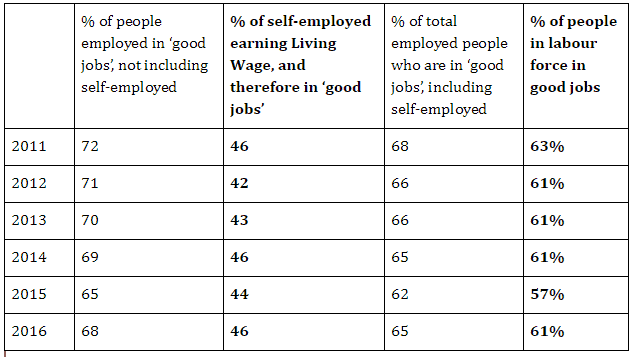Two in five of the UK workforce still in ‘bad jobs,’ according to NEF analysis Job quality is worse for the self-employed, where low income is rife Buoyant employment figures obscure reality as insecure and underpaid workforce close to breaking point More than half of all self-employed people are failing to earn a decent living, according to new research by the New Economics Foundation. The research, based on data from the ONS Labour Force Survey and the DWP Family Resources Survey, shows that two in every five people employed in the UK last year were in ‘bad jobs,’ defined as jobs which do not provide a secure, living wage. That figure rises to 54% for the self-employed. In 2011, 63% of the labour force were in ‘good jobs.’ But by 2016, that figure had dropped
Topics:
neweconomics considers the following as important:
This could be interesting, too:
Robert Vienneau writes Austrian Capital Theory And Triple-Switching In The Corn-Tractor Model
Mike Norman writes The Accursed Tariffs — NeilW
Mike Norman writes IRS has agreed to share migrants’ tax information with ICE
Mike Norman writes Trump’s “Liberation Day”: Another PR Gag, or Global Reorientation Turning Point? — Simplicius
- Two in five of the UK workforce still in ‘bad jobs,’ according to NEF analysis
- Job quality is worse for the self-employed, where low income is rife
- Buoyant employment figures obscure reality as insecure and underpaid workforce close to breaking point
More than half of all self-employed people are failing to earn a decent living, according to new research by the New Economics Foundation.
The research, based on data from the ONS Labour Force Survey and the DWP Family Resources Survey, shows that two in every five people employed in the UK last year were in ‘bad jobs,’ defined as jobs which do not provide a secure, living wage. That figure rises to 54% for the self-employed.
In 2011, 63% of the labour force were in ‘good jobs.’ But by 2016, that figure had dropped to 61% – suggesting that the quality of jobs in the UK labour market is flatlining or getting worse over time. [2]
Whilst the latest unemployment figures are likely to be the lowest seen in decades, the reality is less optimistic. Employment figures are being propped up by increasing numbers of self-employed people. While many choose self-employment in order to benefit from flexibility and independent working conditions, this research shows how many fail to earn a decent living. This is combined with record numbers of people on zero hours contracts – which have increased fivefold since 2011.
‘Good jobs’ in the UK, 2011 to 2016

Sources: ONS Labour Force Survey and the DWP Family Resources Survey
Hanna Wheatley, Researcher at the New Economics Foundation, said:
“The overall unemployment figures paint a far more rosy picture of the labour market than what we know to be the reality – an underpaid and insecure workforce stretched to the limits.
One in three people on zero hours contracts say they don’t have enough hours to provide for themselves.And while some benefit from the flexibility of being self-employed, many don’t. The rise in self-employment is hardly a cause for celebration when over half don’t earn enough to live a decent life.
It seems that good jobs were the sacrifice made to avoid the worst effects of unemployment during the recession. But the situation for many is reaching crisis point.
At the New Economics Foundation we are supporting people to take control of their working lives. It is vital that the voices of workers are at the forefront of the debate about the future of work.”
Good jobs are defined by NEF as secure jobs that pay at least the Living Wage. A secure job provides either a permanent employment contract, or a temporary employment contract where the reason for having a temporary contract is cited as ‘did not want a permanent contract.’ Because there is no measure of whether self-employed people feel secure in their work, we assume all self-employed are in secure work. The number of self-employed not meeting the ‘good job’ standard is therefore likely to be far greater than indicated here.
The Living Wage is independently calculated each year by the Living Wage Foundation, based on what employees and their families need to live.
-ENDS –
** Spokespeople available for interview **
Notes to editors
- The New Economics Foundation is the UK’s only people-powered think tank. The Foundation works to build a new economy where people really take control. www.neweconomics.org
- Further details of the methodology can be found here.
- Calculated using data from the Labour Force Survey 2016
